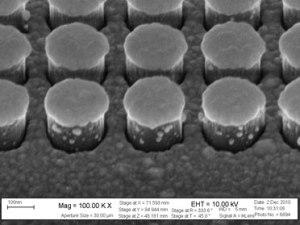Feb 15 2011
Drs. Joshua Caldwell and Orest Glembocki, scientists at the U.S. Naval Research Laboratory, Electronic Science and Technology Division, working closely with a team of researchers, have developed a sensor that will detect fingerprints of threat agents at the tracing level.
 NRL's Nano Pillar Array
NRL's Nano Pillar Array
Prompt tracking of chemical, biological and explosive substances is a crucial step in the defense sector that will facilitate quick reaction and response that will ensure survival of troops.
Large area gold covered silicon nano pillar arrays are over 100 million times more sensitive than the Raman scattering sensing, yet retain a steady response displaying less than 30% variability over the entire sensor. Raman devices deploy a laser light that helps simulate molecular vibrations that cause the scattered laser photons energy to move up or down, thus leading to a distinct visual pattern. Ordinary Raman sensors are unable to trace this pattern in gases and liquids. The SERS effect can however increase the Raman signal with the help of metal nanoparticles. According to Caldwell, the arrays could become an essential party of the integrated, independently operating chemical sensors that will sense and track the threat at the trace levels of an exposure.
Its high speed of measurement, sensitivity, mobility, and easy movement ensure that the SERS is a better option than other spectroscopic techniques. It can also improve upon current Raman technologies, including the hand held and standoff units currently in deployment in field applications.